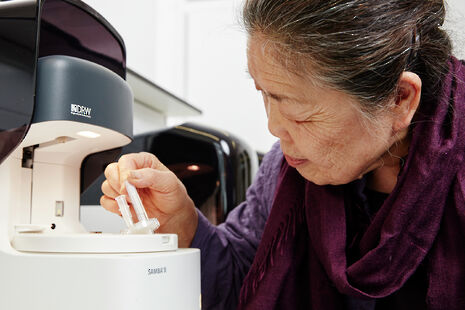Cambridge researcher wins prize for a device helping to fight HIV in Sub-Saharan Africa
Dr Helen Lee, an inventor in Cambridge University’s Department of Haematology, has been honoured for her work on HIV diagnosis

Dr Helen Lee, an inventor in Cambridge University’s Department of Haematology, has been honoured for her work on HIV diagnosis, winning the Popular Prize at the 2016 European Inventor Awards.
Fending off 14 other finalists, Dr Lee gained 64 per cent of the 56,700 online public votes in the competition run by the European Patent Office (EPO). The gong was awarded for a HIV diagnostic device, the SAMBA, which can help fight the virus in less economically developed countries, particularly in sub-Saharan Africa.
“We wanted something that anyone who can cook can use”, said Dr Lee. The device delivers an uncomplicated result in the form of one or two easy-to-read lines and resembles a coffee machine with simple cartridges.
Her company, Diagnostics for the Real World, created the SAMBA diagnostic test in 2011, retaining at most 15 per cent of the profits it generates.
The device has been used to test over 40,000 patients for HIV in Malawi and Uganda, and may prove of use to the 20 million people thought to carry the HIV virus in sub-Saharan Africa.
“I think the most important thing is to be useful in your life”, said Dr Lee. “When I see that our immediate results made a difference in their lives, then you really look at the effort, and you say yes, that was worth it.”
Benoit Battistelli, President of the EPO, said: “The years of work Helen Lee has devoted to developing easy-to-use rapid tests for infectious diseases such as AIDS and Hepatitis B have been overwhelmingly recognised by the public.
“The clear vote is proof of the important role played by point-of-care diagnostics in regions without comprehensive medical care. Lee has made a major contribution towards the early detection of infections and their treatment in areas most in need”.
Dr Lee has previously worked at a major US healthcare firm, Abbott Laboratories, and notes that she couldn’t have invented her diagnostic equipment if she had remained.
“If I’d still been at Abbott I would have been fired a long time ago”, she noted. “In fact, I would have fired myself because you can’t do this in two to three years”.
“People think you have to be clever to invent. But I think it’s the persistence, the perseverance”.
 News / Colleges charge different rents for the same Castle Street accommodation2 March 2026
News / Colleges charge different rents for the same Castle Street accommodation2 March 2026 News / King’s hosts open iftar for Ramadan3 March 2026
News / King’s hosts open iftar for Ramadan3 March 2026 Theatre / Lunatics and leisure centres 4 March 2026
Theatre / Lunatics and leisure centres 4 March 2026 News / Angela Merkel among Cambridge honorary degree nominees27 February 2026
News / Angela Merkel among Cambridge honorary degree nominees27 February 2026 News / News in Brief: waterworks, wine woes, and workplace wins 1 March 2026
News / News in Brief: waterworks, wine woes, and workplace wins 1 March 2026







